From reproductive rights to climate change to Big Tech, The Independent is on the ground when the story is developing. Whether it’s investigating the financials of Elon Musk’s pro-Trump PAC or producing our latest documentary, ‘The A Word’, which shines a light on the American women fighting for reproductive rights, we know how important it is to parse out the facts from the messaging.
At such a critical moment in US history, we need reporters on the ground. Your donation allows us to keep sending journalists to speak to both sides of the story.
The Independent is trusted by Americans across the entire political spectrum. And unlike many other quality news outlets, we choose not to lock Americans out of our reporting and analysis with paywalls. We believe quality journalism should be available to everyone, paid for by those who can afford it.
Your support makes all the difference.
Read more
Vice President JD Vance was the one to call Indian Prime Minister Narendra Modi to encourage ceasefire talks over the escalating conflict with Pakistan after the U.S. received “alarming intelligence,” according to a report.
The vice president, Secretary of State and interim national security adviser Marco Rubio, and White House chief of staff Susie Wiles were compelled to increase America’s role in the conflict after receiving the intelligence Friday morning, CNN reports.
It marked a change of position for Vance, who said that the dangerous conflict between the two nuclear powers was “none of our business.”

open image in gallery
The vice president, Secretary of State and interim national security adviser Marco Rubio, and White House chief of staff Susie Wiles were compelled to increase America’s role in the conflict after receiving the intelligence Friday morning, according to the report. (AP)
After reportedly briefing President Donald Trump on the latest developments and their plan of action, Vance then called Modi at noon E.T. on Friday, telling him the White House believed there was a high probability for dramatic escalation, the report says.
CNN also reports that Vance outlined to Modi a “potential off-ramp” that the U.S. understood the Pakistanis would be amenable to. Further details of that were not disclosed.
“Vance encouraged Modi to have his country communicate with Pakistan directly and to consider options for de-escalation, the officials said,” according to CNN.
Rubio and State Department officials reportedly “worked through the night” liaising with their counterparts in India and Pakistan.
The Trump administration’s role was largely to get the two sides talking, rather than drafting the ceasefire agreement, officials told CNN.
Days before, Vance gave an interview on Fox News where he said America should not get too involved.

open image in gallery
Just a few hours after the ceasefire agreement, the countries accused each other of violating it after explosions were heard over two cities in India-administered Kashmir. (AFP via Getty Images)
“What we can do is try to encourage these folks to de-escalate a little bit, but we’re not going to get involved in the middle of war that’s fundamentally none of our business and has nothing to do with America’s ability to control it,” Vance said Thursday.
“You know, America can’t tell the Indians to lay down their arms,” Vance said. “We can’t tell the Pakistanis to lay down their arms. And so, we’re going to continue to pursue this thing through diplomatic channels.”
The Independent has contacted the White House for comment.
Trump announced Saturday morning U.S. time that India and Pakistan agreed to a “full and immediate ceasefire” after America mediated the talks.
“Congratulations to both Countries on using Common Sense and Great Intelligence,” the president posted on Truth Social, claiming credit for brokering the peace.
While Pakistan expressed gratitude for the U.S. involvement, India’s foreign secretary Vikram Misri said two countries worked “directly” to reach the deal.
Just a few hours later, the countries accused each other of violating the ceasefire agreement after explosions were heard over two cities in India-administered Kashmir.
